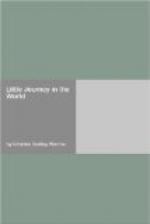It is such a good and prosperous generation.
XIV
Our lives are largely made up of the things we do not have. In May, the time of the apple blossoms—just a year from the swift wooing of Margaret—Miss Forsythe received a letter from John Lyon. It was in a mourning envelope. The Earl of Chisholm was dead, and John Lyon was Earl of Chisholm. The information was briefly conveyed, but with an air of profound sorrow. The letter spoke of the change that this loss brought to his own life, and the new duties laid upon him, which would confine him more closely to England. It also contained congratulations—which circumstances had delayed—upon Mrs. Henderson’s marriage, and a simple wish for her happiness. The letter was longer than it need have been for these purposes; it seemed to love to dwell upon the little visit to Brandon and the circle of friends there, and it was pervaded by a tone, almost affectionate, towards Miss Forsythe, which touched her very deeply. She said it was such a manly letter.
America, the earl said, interested him more and more. In all history, he wrote, there never had been such an opportunity for studying the formation of society, for watching the working out of political problems; the elements meeting were so new, and the conditions so original, that historical precedents were of little service as guides. He acknowledged an almost irresistible impulse to come back, and he announced his intention of another visit as soon as circumstances permitted.
I had noticed this in English travelers of intelligence before. Crude as the country is, and uninteresting according to certain established standards, it seems to have a “drawing” quality, a certain unexplained fascination. Morgan says that it is the social unconventionality that attracts, and that the American women are the loadstone. He declares. that when an Englishman secures and carries home with him an American wife, his curiosity about the country is sated. But this is generalizing on narrow premises.
There was certainly in Lyon’s letter a longing to see the country again, but the impression it made upon me when I read it—due partly to its tone towards Miss Forsythe, almost a family tone—was that the earldom was an empty thing without the love of Margaret Debree. Life is so brief at the best, and has so little in it when the one thing that the heart desires is denied. That the earl should wish to come to America again without hope or expectation was, however, quite human nature. If a man has found a diamond and lost it, he is likely to go again and again and wander about the field where he found it, not perhaps in any defined hope of finding another, but because there is a melancholy satisfaction in seeing the spot again. It was some such feeling that impelled the earl to wish to see again Miss Forsythe, and perhaps to talk of Margaret, but he certainly had no thought that there were two Margaret Debrees in America.




